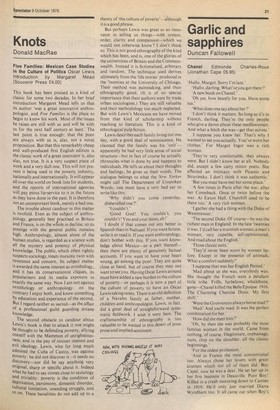Knots
Donald MacRae
Five Families: Mexican Case Studies in the Culture of Politics Oscar Lewis Introduction by Margaret Mead (Souvenir Press £4.00) This book has been praised as a kind of classic for some two decades. In her brief introduction Margaret Mead tells us that its author 'was a great innovative anthropologist, and Five Families is the place to begin to know his work. Most of the issues he raises are still with us and will be with us for the next half century at least.' The last point is true enough: that the poor are always with us is, alas, not a novel proposition. But that this remarkably cheap and well-produced first English edition is the classic work of a great innovator is, also alas, not true. It is a very suspect piece of work and a very dull one. This will not prevent it being used in the poverty industry, nationally and internationally. It will appear all over the world on book lists for students, and the reports of international agencies will pay pious lip-service to it in the future as they have done in the past. It is therefore not an unimportant book, merely a bad one.
The trouble about candour in this matter is twofold. Even as the subject of anthropology, generally best L3oractised in Britain and France, is on the whole in decline, so its Prestige with the general public remains high. Anthropology, almost alone of the human studies, is regarded as a science with all the mystery and potency of physical knowledge. The public, which often rightly suspects sociology, treats itsexotic twin with reverence and concern. Its subject matter IS awarded the same interest as ornithology, and it has its conservationist cliques, its Popularisers and its media exposure in exactly the same way. Now I am not against ornithology or anthropology : on the contrary I enjoy both, and know something by education and experience of the second. But I regard neither as sacred—as the affair of a professional guild guarding arcane knowledge.
Thc second obstacle to candour about Lewis's book is that to attack it one might be thought to be defending poverty, allying oneself with the Mammon of unrighteous'less, and in the pay of sinister interest and evil ideology. Lewis, who for long much admired the Cuba of Castro, was against Poverty: he did not discover it—it needs no discovery—nor did he say anything very original, sharp or specific about it. Indeed what he had to say comes close to tautology and triviality : poverty is the condition of deprivation, parsimony, domestic disorder, cultural limitation, unending struggle, and SO on. These banalities do not add up to a theory of 'the culture of poverty'—although it is a good phrase.
But perhaps Lewis was great as an innovator in telling us things—with system, order, clarity and compassion—which we would not otherwise know ? I don't think so. This is not good ethnography of the kind which has been, and is, one of the glories of the universities of Britain and the Commonwealth. Instead it is fictionalised, arbitrary and random. The technique used derives ultimately from the 'life stories' produced in the 'twenties at the University of Chicago. Their method was painstaking, and their ethnography .good. (It is of no special importance that their authors were by trade urban sociologists.) They are still valuable and their methodology too much neglected. But with Lewis's Mexicans we have moved from that kind of scholarship without reaching to literature. This is a kind of ethnological pulp fiction.
Lewis describes each family living out one day, with a good deal of reminiscence. He claimed that the family was his 'unit'— apparently he had very little sense of social structure—but in fact of course he actually chronicles what is done by and happens to individuals. He tells us about their thoughts and feelings; he gives us their words. The dialogue belongs to what the New Yorker might call The Department of Unspoken Words; one must have a very bad ear to write like this: 'Why didn't you come yesterday, dishevelled one?'
'I couldn't.'
'Good God! You couldn't, you couldn't ! You and your dates, eh !'
I doubt it' that comes out any better in Spanish than in Nahuatl. If you want fiction, write it or read it. If you want anthropology. don't bother with this. If you want knowledge about Mexico—or a part thereof— then there are plenty of genuinely factual accounts. If you want to have your heart wrung, go among the poor. They are quite close at hand, but of course they may not want to see you. Having Oscar Lewis around must have added a new burden to the culture of poverty—or perhaps it is now a part of the culture of poverty to have an Oscar Lewis taking notes. There is an old definition of a Navaho family as father, mother, children and anthropologist. Lewis, in fact, did a great deal of straightforward systematic fieldwork. I wish it were here. The craftsmanship of ethnography is too valuable to be wasted in this desert of poor prose and implied sentiment.


































 Previous page
Previous page